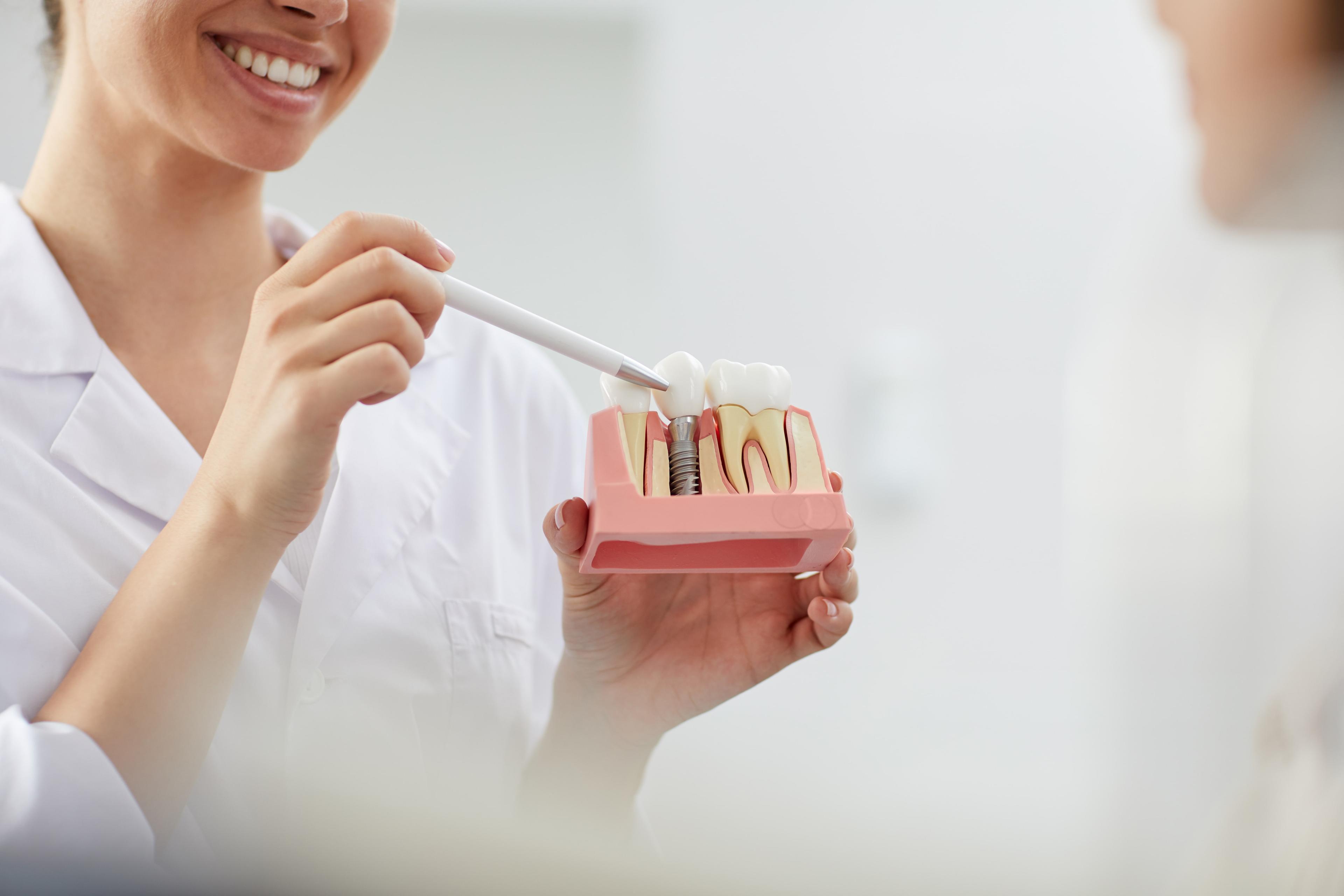Dental Implants: Problems, Types, and Benefits
Key Takeaways
- Dental implants are prosthetic replacements for missing teeth
- There are 2 main types of dental implants: endosteal and subperiosteal implants
- Dental implants are the better choice in comparison to dentures as they’re more naturally suitable
Dental implants are prosthetic replacements for missing teeth. Here, an artificial screwlike root is implanted into your jaw and an artificial tooth takes the place of the damaged or missing one.
Dental implants are sturdy and stable replacements for missing teeth, and they stand on their own, not affecting the other natural teeth nearby. As a matter of fact, dental implants have a success rate that’s close to 98%, but this also means there is room for complications. Dental implants problems are something to account for, but the advantages usually outweigh these.
It is also important to know that not everyone qualifies for dental implants. While an implant does solve problems with respect to the overall function of the mouth and its aesthetics, not everyone can handle the surgical pressure of this treatment. In such cases, other options like dentures serve as a viable alternative, especially for older patients.
However, dental implants are the better choice in comparison to dentures as they’re more naturally suitable and do not rely on the adjacent teeth whatsoever. To know about dental implants, the different types, and their risks and benefits, read on.
When do you need dental implants?
In most cases, you need a dental implant when you have a missing tooth. However, as mentioned earlier, not everyone qualifies for dental implants and dentists conduct thorough clinical assessments before giving the green light. However, dental implants aren’t the only solution. You also have bridgework, which is where natural teeth support the new fixture, or you can have dentures too. So, when you want or need to avoid dentures or a bridge for a missing tooth, a dental implant becomes the best solution.
What are the different types of dental implants?
There are 2 main types of dental implants: endosteal and subperiosteal implants. Each of these have differences, mainly to do with how they’re fixed and their long-term viability. Endosteal dental implants are those that are commonly used today and are the far superior option. These are implants that are inserted into the jawbone and provide a sturdy and reliable long-term solution.
On the other hand, subperiosteal implants refer to an older practice wherein the implant would rest under the gum and on top of the jawbone. As such, its long-term effectiveness is lacking in comparison to that of endosteal implants. Moreover, subperiosteal dental implants aren’t as common today and they may be recommended to you only if your bone height is minimal.
Additional Read: Tooth Extraction GuidelinesWhat are the main dental implant benefits?
Besides restoring function and improving oral health, there are quite a few dental implant benefits that you should be aware of. Here is quick overview of how dental implants help.
- Improve speech: Since they’re secured and sturdy, unlike dentures, dental implants minimise the slurring of words and mumbling.
- Improve comfort: Dental implants are fixed and permanent, which means you don’t have to constantly remove them. This adds a layer of comfort as it is more natural.
- Improve self-esteem: Missing front teeth or any visible teeth can greatly affect how you feel about your smile. Dental implants fix that problem and give you back any lost confidence.
- Improve oral health: Unlike tooth-supported bridge treatments, dental implants are standalone fixtures that don’t require a dentist to alter the adjacent teeth. Moreover, they allow for easy access between teeth, and this can improve oral hygiene by a large degree.
- Improve chewing: Dental implants feel like natural teeth. As such, chewing feels easier as you aren’t worried about the teeth sliding in your mouth. This is a common inconvenience experienced by dentures, which is eliminated by dental implants.
- Remain durable: Dental implants are permanent and with care, they can last a lifetime.
Who can get dental implants?
Not everyone can get dental implants and there are few factors that determine whether you qualify for such treatment. Firstly, and most importantly, you need to be healthy enough to endure and undergo dental extraction and surgery. If you pass this criteria, then you will be assessed based on the following terms.
- Existence of healthy gums
- Existence of bone mass to hold an implant
- Development of jawbone
- Ability to undergo a bone graft
- Existence of existing health conditions that affect bone healing
- Existence of healthy oral tissue
- Willingness or ability to wear dentures
- Ability to commit to the treatment and its process
- Existence of the habit of consuming tobacco
What are common dental implants problems?
Knowing all about the dental implant side effects is a key element of being fully informed about such treatments. Common dental implants problems include:
- Injury to the surrounding teeth or blood vessels
- Nerve damage, which can lead to pain in natural teeth
- Infections being developed at the implant site
- Sinus issues, which is when the dental implant in the upper jaw enters into the sinus cavity.
Understanding dental implant treatment goes beyond knowing the types of dental implants and cost of undergoing it. In fact, armed with this information, you can now make more informed decisions. With a better grasp of the main dental implant benefits and potential risks, you can also weigh your options better. However, it is best to follow the recommendation of a specialist, especially if they suggest that you do need an implant. Ignoring this advice can cause problems down the line that will most likely be costlier to fix. So, if you’ve noticed signs that you may need an implant or know that you need one, use the Bajaj Finserv Health App to find the right dentist for the treatment.
This digital provision is loaded with telemedicine features and benefits that give you a range of healthcare options at your fingertips. The convenience-first features include the smart doctor search functionality which enables you to find the best doctors in your area and book appointments online, right from your smartphone. Additionally, you get access to the Health Vault, which can be used to store and send digital patient records to specialists as needed. This makes remote care possible and more reliable too. Another notable perk is that you can virtually consult doctors over video using the app, thus ensuring care even when a physical visit isn’t possible. For all these benefits, download the app for free from the Apple App Store or on Google Play today!
- https://www.mayoclinic.org/tests-procedures/dental-implant-surgery/about/pac-20384622
- https://www.webmd.com/oral-health/guide/dental-implants#2
- https://clovedental.in/specialties/dental-implant/
- https://www.medicinenet.com/dental_implants/article.htm#what_are_the_types_of_dental_implants_why_are_they_used
Please note that this article is solely meant for informational purposes and Bajaj Finserv Health Limited (“BFHL”) does not shoulder any responsibility of the views/advice/information expressed/given by the writer/reviewer/originator. This article should not be considered as a substitute for any medical advice, diagnosis or treatment. Always consult with your trusted physician/qualified healthcare professional to evaluate your medical condition. The above article has been reviewed by a qualified doctor and BFHL is not responsible for any damages for any information or services provided by any third party.



